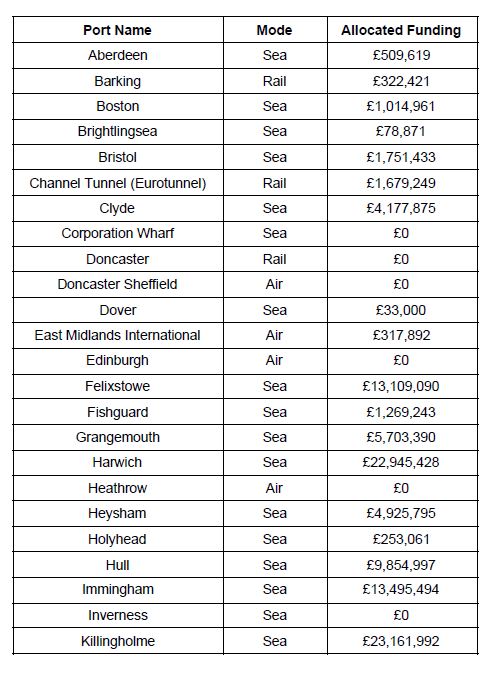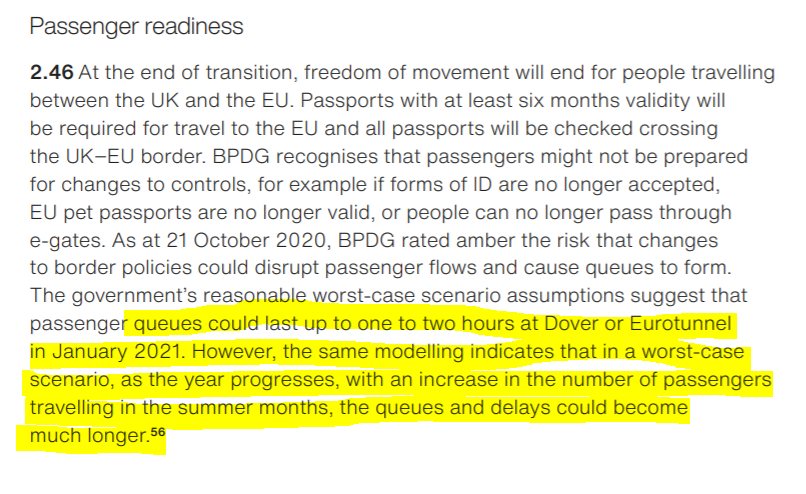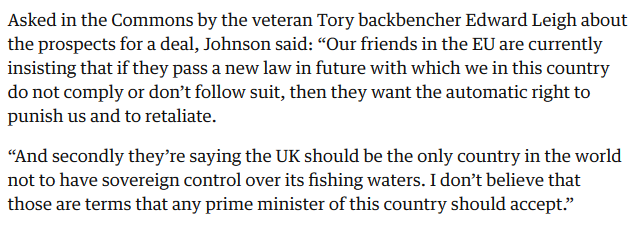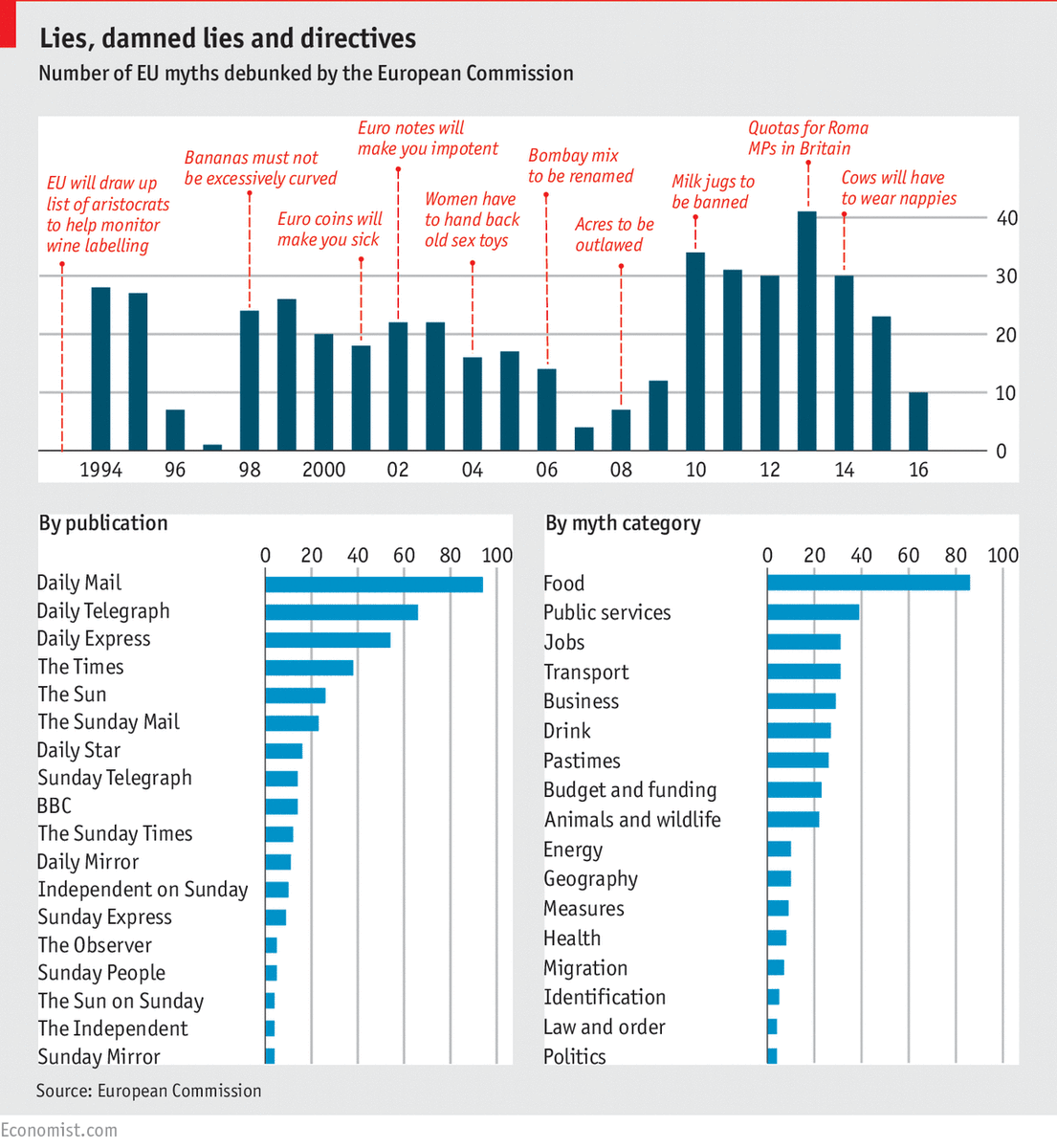Alex1Powell Categories Brexit
Whether it be Gavin Williamson
or Jeremy Hunt
Why they need this amidst the shitshow of brexit and the disaster of covid?
Is a fascinating question
Is British science the best in the world? My question to the boss of our gold medal winning regulator, Dr June Raine pic.twitter.com/cR9977XeUt
— Jeremy Hunt (@Jeremy_Hunt) December 9, 2020
A reminder
We could only approve this vaccine so quickly because we have left the EU. Last month we changed the regulations so a vaccine did not need EU approval which is slower. https://t.co/y2Az7okPdx
— Jacob Rees-Mogg (@Jacob_Rees_Mogg) December 2, 2020
Most important change on January 1st will be higher trade costs due to creation of UK-EU customs border plus restrictions on what services trade is allowed
Costs from regulatory divergence likely to be at least as important as border costs in the long run, but not immediately 2/
Expect disruption & delays at the border for the first few months
However, I do not anticipate shortages of essential goods, as imports can be expedited if needed, e.g. air freight, priority customs processing 3/
Delays will become shorter and more predictable as firms learn what paperwork is needed and customs capacity improves. Important for just-in-time supply chains where predictability is more important than speed 4/
Contrary to government claims, many costs will be permanent:
- Red tape, e.g. need for customs workers wastes resources & lowers productivity
wasting resources
- Tariffs (if no deal)
- Rules of origin (if deal)
- Lost market access for services
https://t.co/07wNehNn7z 5/
Fwiw I get told that economics and process considerations (haulage, logistics, manufacturing etc) play limited role in #brexit inner circle decision-making. Belief it\u2019ll be messy but business will adjust. Q is more short term political embarrassment. 2/2
— Peter Foster (@pmdfoster) December 13, 2020
So what is this all about? Well back in October the govt announced a £200m Port Infrastructure Fund - details below - for ports to get ready for the new trade processes for #Brexit border. Dealing with those 215m extra customs decs etc..
Today we find out what everyone got - but it turns out that 54 ports asked for more than £450m - so a LOT have been bitterly disappointed. Not just Dover (on which more in a second)...they are furious the government is not willing to fully fund the very borders they mandated /3
So here is the list of what everyone got - 41 ports had winning bids totaling just over £194m - but you'll note that Dover got...wait for it...£33k. No, that is not a type. Thirty-three thousand pounds. They asked for £33m!! Why? Well to build new passport lanes. /4

Why? Because as an @NAOorguk report warned in November the Govt's 'reasonable worst case scenario' for delays at Dover for passenger traffic was "one to two hours" and "much longer" in the summer. Eeek. Happy hols everyone! /5
https://t.co/K77Is5tfxk

But that's ok
Priti only meant it unintentionally
And she was frustrated when she said it
So that's
[thread]
— ScottishPanda (@PandaScottish) November 23, 2020
The most difficult thing I find is writing the hook into a thread
There is a simple word
It is called Imagine
But first I want to focus on a different topic
Nigeriahttps://t.co/bF4zaDguzh
It's not like the UK talked of invading Spain or Calais
Or was busy trying to incite Irexit, Itexit or the AfD or so other discord in the EU
After all that 50 pence piece
Talks of friendship
So surely we were good friends?
Those liars who had nothing
And knew they had nothing
Well they passed their withdrawal agreement
Knowing they never had any intention of honouring
[thread] a simple question
— ScottishPanda (@PandaScottish) October 17, 2019
What are you prepared to sacrifice for brexit ?
Boris Johnson and his historic wordshttps://t.co/nFkevENjqB
Oh yes and a reminder
How many Tory MPs are unashamed they passed legislation without forming an opinion on it
Quite an admission by Mandelson https://t.co/yY2Ym0ggby pic.twitter.com/SSVXO9vc43
— Anand Menon (@anandMenon1) December 4, 2020
Let’s put aside for a moment the rights and wrongs of a ‘soft’ Brexit. (Wrong mainly because no one voted for it in the 2016 referendum; it literally wasn’t on the ballot paper.)
There was a fleeting opportunity for a soft Brexit in 2016 *if* the-then PM had chosen to make delivering Brexit a cross-party endeavour. This is what she should have done on an issue of such strategic national importance, and I told her so at the time.
There was a second missed opportunity after the 2017 General Election delivered a hung Parliament. That is as strong a signal as you get in our democracy that it’s time for a cross-party approach. Theresa May chose to buy a confidence-and-supply agreement with the DUP instead.
By mid-2018, the political reality was that Parliament’s choice was between a confirmatory referendum or a Hard (‘No Deal’) Brexit because enough of the Conservative party wanted a ‘clean’ Brexit and the rest either couldn’t agree on an alternative or didn’t care either way.
Michael Gove: "Outside the EU, with a good trade deal in place, we can tackle the injustices and inequalities that have held Britain back."
— Jennifer Rankin (@JenniferMerode) December 26, 2020
The UK did not need to leave the EU to tackle injustices and inequalities at home. Not a new point, but true.https://t.co/fE4glUAylc
There has never been level playing field content like this in a trade deal. The idea it is any kind of UK win, when the UK's opening position was no enforceable commitments whatsoever, is ridiculous.
For the lawyers. Night. pic.twitter.com/5XvFMhcaeE
— Sam Lowe (@SamuelMarcLowe) December 25, 2020
The EU can take retaliatory action against the UK if we weaken labour standards, weaken pretty firm climate change targets, unfairly subsidise, or just in general seem to be out of line. There are processes to follow, but it looks like the PM did it again...

Final one for now. Quite how Labour gets itself in such a fuss about whether to support a deal with the strongest labour and environment commitments ever seen in a trade deal is a sign of just how far it hasn't moved on from leaving.
PS well... (sorry DAG). It certainly didn't have a good effect. And I think if we had settled LPF issues with the EU much earlier there is a good chance the conditions would have been far less stringent. By making an issue, we made it much worse.
As a lay person is it fair to say that the \u201cthreat\u201d to break international law in Ireland was possibly a strategic blunder that has now determined the future trajectory of the UK for the next 20 years? I can imagine most countries will study what\u2019s baked into this and replicate?
— Meister 1 (@blueelmacho) December 26, 2020
This is perhaps the most complex 🧵 on #Brexit I've ever attempted. But this issue really matters.
Business, possibly even lives, depend on getting this stuff right.
It is about the complexity of Brexit delay, and what to do about it.
1/25
If negotiations had gone to plan, it would have worked thus:
1️⃣ 🇬🇧&🇪🇺 agree a Deal, politically
2️⃣ That is then turned into a legally ratifiable text
3️⃣ Both sides then ratify - on 🇪🇺 side Member States and the EP, 🇬🇧 side the Houses of Parliament
4️⃣ Deal in force 1.1.2021
2/25
The problem: we do not have 1️⃣ yet.
And with just over 16 days to go - including 🌲 - we do not have time for 2️⃣ and 3️⃣ and hence no 4️⃣.
We *might* have time for 2️⃣ - and that could prove to be significant (see tweet 7 below), but definitely not 3️⃣ on 🇪🇺 side.
3/25
*Essential* problem: by having spent so long talking (I think 🇬🇧 tactic has been to run down the clock - https://t.co/8EJZAJZHqz ) the path to a normal ratification is now ⛔️.
Now ratification becomes harder - legally, politically, practically - with every passing hour.
4/25
The most obvious stumbling block is...
🥁🥁🥁
... the European Parliament!
Parliamentary sovereignty, eh? A topic for another time.
Anyway, the EP has said it will not vote on a Brexit Deal this
Pretty clear again speaking to Mep's they won't countenance debating or ratifying any EU-UK trade agreement before December 31st #Brexit
— Shona Murray (@ShonaMurray_) December 15, 2020
Mep's are pretty annoyed at the very suggestion that it would be provisionally applied and the ratification would be a simple rubber stamp.
The EU Settled Status scheme deadline is looming. Tens of thousands of vulnerable people face being criminalised overnight.
The Home Office must #ScrapTheDeadline & ensure no one loses status. Please chip in https://t.co/0FydGTuDHx
Our case [thread]
2/ The deadline on the EU Settled Status scheme is a cliff edge. Overnight, tens of thousands of people could be criminalised just for living their lives and will face the full horrors of the hostile environment. #ScrapTheDeadline
3/ People who are already vulnerable are at highest risk of getting left out. The risks are well documented. E.g. This paper by @MigObs explains how victims of abuse and exploitation, and people who are isolated are at highest risk:
4/ Other organisations have sounded the alarm on other discriminatory impacts. @npcthinks found that “female EU migrants are at greater risk of failing to access their settled status than male EU migrants” https://t.co/2owPFTyZ1o …
5/ …while @coram set out the risks of the EU Settlement scheme for children, especially looked-after children https://t.co/n4WAgWhF0J and @gmiau researched into barriers for looked-after children
Today we are looking back to series 1 of our podcast where @NicoleSykes_ and @chrisgreybrexit discussed Brexit and Business with @ProfTimBale.
— Mile End Institute (@MileEndInst) December 7, 2020
What has business done - and not been able to do- to make the best of #Brexit?
Listen here: https://t.co/ioGZx9qlSY
I’ve lost track of how many times I’ve been told over the last 5yrs that it’s because business wasn’t loud enough. 1st during the referendum (though post-🗳️ analysis tends to agree the economic argument was won, it just wasn’t important enough). 2nd during the negotiations (2/)
I’ve said a lot about this in the past, ultimately - yes biz could have been louder. But there are many reasons why they weren’t.
And volume really isn't everything. Any lobbyist knows that you’re only loud when you’re already losing. It’s a symptom, not a cause, of loss (3/)
So how did business start losing on Brexit? This story has 3 beginnings:
1. The decline in trust through the 00s, when respect diminished
2. #indyref where biz learned the hard way what being dragged into a polarising political furore felt like. That backlash scarred.
(4/)
3. The birth of Business for Britain
Honestly, Business for Britain were brilliant at what they did. I think they genuinely did try to woo business on side initially. But when that didn’t work, they switched strategy very rapidly and pulled every lever available to them (5/)

















